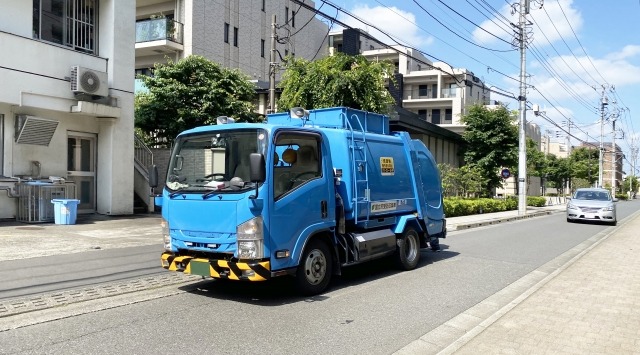
NEW
公開日:
最終更新日:

使わなくなったクーラーボックスの処分に悩む方は少なくありません。特にキャンプやレジャーの季節が終わると、古くなったクーラーボックスをそのまま保管しているご家庭も少なくありません。
本記事では、クーラーボックスを処分するための6つの方法を解説します。
この記事でわかること
クーラーボックスは自治体によって分別ルールや処分費用が大きく異なります。自宅に眠っているクーラーボックスを適切に処分したい方は、ぜひ最後までご覧ください。

クーラーボックスを処分する際は、素材やサイズによる分類の違い、そして自治体のリサイクル方針を確認することが重要です。
上記の2つのポイントをもとに、クーラーボックスの処分方法を検討しましょう。
クーラーボックスは使用されている素材によって分別方法が大きく変わります。
また、サイズによっても分類が異なります。大抵のクーラーボックスのサイズであれば、指定のゴミ袋に入るため、そのまま袋に入れて出すだけで簡単に処分できます。
ただし、自治体のルールにもよりますが、クーラーボックスのサイズが1辺30〜50cm以上であれば、粗大ごみに分類されるでしょう。小型の10リットル以下であれば燃えないごみ、30リットル以上の大型は粗大ごみになる傾向があります。
素材やサイズを確認することが第一歩となるため、処分前には必ず商品の仕様を把握しておきましょう。
処分方法を決定する前に、自治体の公式サイトで必ず分別ルールを確認しておきましょう。同じ東京都内でも区によって分別が異なり、隣接する市区町村であっても処分方法が異なることもあります。
多くの自治体では、公式サイト上で粗大ごみや不燃ごみの料金表を公開しています。検索欄に「クーラーボックス」と入力して、料金を確認しましょう。
POINT
なお、WEBサイトで情報が見つからない場合や詳細が不明な場合は、電話で問い合わせることがおすすめです。また、自治体によっては持ち込み処分やリサイクル拠点での回収も行っているため、リサイクルも積極的に活用しましょう。

クーラーボックスを処分する方法は多岐にわたります。
ここでは実際に選択できる6つの方法について、それぞれ解説します。
確実に処分できる一般的な方法の1つが、粗大ごみとしての処分です。申込みは、電話またはインターネットから可能で、多くの自治体では24時間受付に対応しています。
クーラーボックスの場合、処分費用は200〜500円前後が相場で、製品のサイズや重量によって料金が設定されています。
手続きが明確で手軽に処分できることが、クーラーボックスを粗大ごみとして出す魅力です。一方で、収集日まで待つ必要があることと、自分で指定場所まで運ぶ必要がある点には注意しましょう。
小型のクーラーボックスであれば、燃えないごみや資源ごみとして処分できる場合があります。目安として、一辺30〜50cm以下の製品であれば、多くの自治体で通常の燃えないごみとして出せます。
ほとんどの自治体ではプラスチック素材または発泡スチロール素材のクーラーボックスは可燃ごみ、金属製のものは不燃ごみに分類されます。処分費用はごみ袋代のみで済むため、費用を抑えて処分できるでしょう。
ただし、自治体ごとにルールが違うため確認必須であり、サイズ制限を超えると受け付けてもらえない可能性があります。
状態が良く人気メーカーの商品であれば、フリマアプリで売却して収益を得られる可能性があります。出品する際は、以下のポイントを押さえると購入が成立する可能性が高まります。
特に、コールマンやイグルーなどの人気ブランドは、中古市場でも需要が高い傾向にあります。出品内容について可能な限りわかりやすく伝えることで、購入者から信頼を得られるでしょう。
メリットは処分費用がかからず、場合によっては収益を得られます。一方で、送料が高額になりやすく、梱包や配送の手間がかかるなどのデメリットもあります。
また、必ず売れるとは限らないため、他の処分方法も並行して検討しましょう。
フリマアプリよりも手間をかけずに売りたい場合は、リサイクルショップでの買取がおすすめです。アウトドア用品を扱う大手リユースショップでは、クーラーボックスの買取を積極的に行っています。
特にコールマン・イグルー・ダイワなどの有名ブランドのクーラーボックスは、高価買取を見込めます。査定は無料で対応しているショップが多く、持ち込み当日に現金化できるなどのメリットがあります。
ただし、使用感が強い商品や古いモデルは状態によっては値段がつかない可能性がある点には注意しましょう。
クーラーボックスが欲しい人に譲渡することも、選択肢の1つです。譲渡方法として、主に3つが挙げられます。
無料であれば、すぐに引き取り手がすぐに見つかるケースも多く、処分の手間や費用を省けます。誰かに役立ててもらえるため、まだ使えるクーラーボックスを処分する際にもおすすめの方法です。
ただし、クーラーボックスを譲渡する際は衛生面への配慮が重要です。内部をきれいに清掃し、においやカビがないことを確認してください。
受け渡し方法についても事前に話し合い、安全な場所で行うよう工夫しましょう。
不用品回収業者は、まとめて大量に処分したい場合や急ぎの処分が必要な場合におすすめの方法です。費用相場は数千円からですが、即日対応を依頼でき、自宅前まで回収に来てくれる点が魅力です。
トラック積み放題パックを取り扱っている場合もあり、クーラーボックス以外にも買取を依頼したいものがあれば、まとめて処分して1点あたりの処分費用を抑えられるでしょう。分別が必要なく、重たい製品も運び出しから任せられるため、手間なく不用品をまとめて処分できます。
即日回収隊では、地域密着型の不用品回収を受け付けています。見積もりや当日手配も追加料金なしで、トラック積み放題の不用品回収パックプランを取り扱っているため、クーラーボックスをはじめ不用品の回収を考えている方は、ぜひ即日回収隊にお問い合わせください。

主要都市におけるクーラーボックスの粗大ごみ処分料金を、以下の表にまとめました。
| 自治体 | 粗大ごみの費用相場 | 備考 |
|---|---|---|
| 札幌市 | 200円 | 電話またはメールで受け付け |
| 仙台市 | 400円 | 30cm以下かつプラスチック素材100%であれば資源ごみ |
| 東京都 江戸川区 | 400円 | 1辺30cm未満であれば家庭ごみ |
| 横浜市 | 500円〜 | 1辺50cm未満であれば家庭ごみ |
| 名古屋市 | 250円 | 電話またはWEBで受付 |
| 大阪市 | 200円 | 電話またはWEBで受付 |
| 京都市 | 400円 | 持込みも可能 |
| 広島市 | 250円〜 | 1辺30cm未満であれば不燃ごみ |
| 福岡市 | 300円〜 | 燃えるごみの袋に入る場合は家庭ごみ |
| 北九州市 | 300円〜 | 事前申し込み制 |
※2025年10月時点の情報です。
クーラーボックスを粗大ごみで出す際の処理手数料は、サイズによって変動します。また、多くの自治体では持ち込み処分を選択すれば料金を抑えられる場合もあるため、対応状況や手間に応じて視野に入れましょう。
なお、粗大ごみの処分料金や区分は、自治体ごとに随時更新される可能性があります。処分の際は、各自治体の最新情報も確認のうえ粗大ごみでの処分費用を把握しましょう。

適切な処分を行うために、以下3つの注意点を必ず押さえておきましょう。
クーラーボックスの処分費用を抑えたい、より良い条件で手放したいと考えている方は、合わせて参考にしてください。
取っ手や金具、フタを外すと、サイズが小さくなり燃えないごみで処分できる場合があるため、簡単に外せるパーツは分解を検討しましょう。多くのクーラーボックスは、ネジやボルトを使わずに組み立てられており、容易に取り外しできます。
分解することで粗大ごみ費用を節約できるメリットがあり、数百円の処分費用を無料にできる可能性があります。キャスターやショルダーなども取り外しの余地があるため、分別のためにも分解を検討しましょう。
ただし、無理に分解しようとすると破損や怪我の危険性があるため、自分自身で取り外せる部品のみに留めることが重要です。
使用感があっても、清掃すればフリマやリサイクルショップで売れる可能性があります。特に内部の汚れやにおいを可能な限り除去すれば、買取価格が大幅に向上することもあります。
ただし、以下の汚れや劣化があれば、買取不可となる恐れがあります。
まずは、中性洗剤などでボックスを洗浄・乾燥したうえで、状態を確認しましょう。
基本的には状態がきれいであればあるほど、高額買取を見込めます。
ただし、ダイワやスタンレーなどのアウトドアブランド製品は中古需要が高いことから、多少の使用感があっても買取対象になる可能性があります。状態が良いスタンレーのクーラーボックスのなかには3,000円を超える買取価格が付く場合もあるため、ブランドや状態をもとに買取を検討しましょう。
自治体・不用品回収業者いずれも、費用は事前に確認することが大切です。自治体の場合は公式サイトや電話で料金を確認し、シール代以外の費用が発生しないことを確認しましょう。
また、業者の場合は悪徳業者に引っかからないよう、料金を明らかにしておくことが大切です。そのうえで意識したいこととして、下記項目もチェックしておきましょう。
料金を複数社で比較検討するほか、料金体系を明らかにしておくことで、作業当日の予想外の出費を防げます。「無料回収」をうたう業者でも、実際は作業費や運搬費として料金を請求されるケースがあるため、事前の詳細確認が重要です。

クーラーボックスをはじめとした不用品の回収を検討しているのであれば、即日回収隊がおすすめです。即日回収隊では、以下の対応で不用品回収を受け付けています。
即日回収隊では荷台に積み放題の不用品回収パックプランを取り扱っています。利用にあたって出張費や見積もり費用は別途かからないため、費用面に不安がある方にもおすすめです。
地域最安値を目指して不用品回収を受け付けているため、クーラーボックスをはじめとした不用品の回収を検討している方は、ぜひ即日回収隊へお気軽にご相談ください!

時間がない方やクーラーボックスをほかの不用品とまとめて処分したい方には、不用品回収サービスの利用がおすすめです。
即日対応・自宅前まで回収・分別不要の3つが揃っており、電話1本で当日中の回収が依頼できます。重たいクーラーボックスの搬出からスタッフに任せられるだけでなく、ほかの不用品もまとめて処分すれば、費用も抑えられるケースもあります。
信頼できる業者を探しているなら即日回収隊の利用がおすすめです。不用品回収に広く対応しており、料金目安は「台車積み放題プラン」も取り扱っています。
不要なクーラーボックスを手放したいと考えている方は、相見積もりの候補として即日回収隊も検討してみてください。
クーラーボックスの処分でお困りの方!
全国の不用品回収、粗大ゴミ処分に365日最短即日で対応させていただきます!
遺品整理やゴミ屋敷の片付けにも対応しております。
お気軽にお問い合わせください!